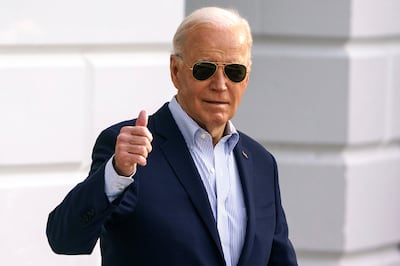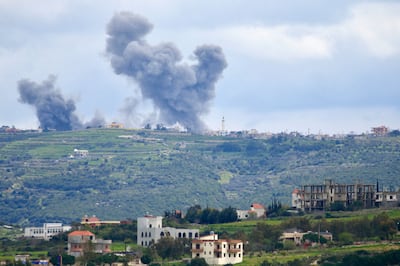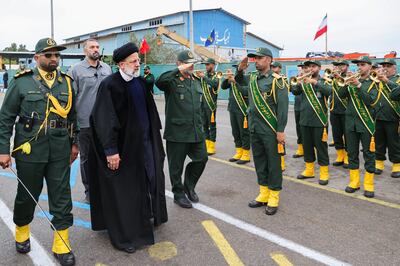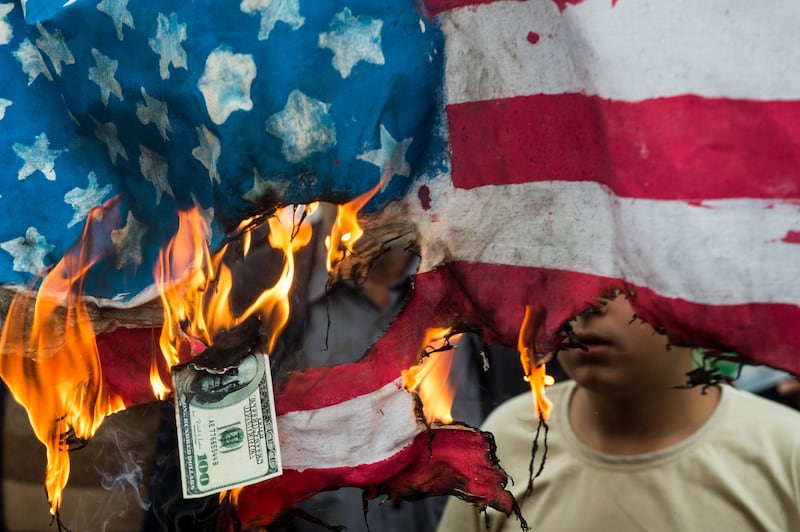Live updates: Follow the latest on Israel-Gaza
Indirect talks between the US and Iran have attempted to build on an unannounced truce in Iraq to expand it across conflict-hit areas of the Middle East, sources have told The National.
Although Washington has not commented on the latest discussions, Iranian state media confirmed the most recent rounds of indirect talks, saying they focused on negotiations for removing sanctions against Iran – thought to be a major motivation for Tehran's increased initiative to mitigate regional conflict.
“There is a clear American push … for the Iranians to maintain the relative restraint they are exercising on their part, especially on the Iraqi front, where an unofficial truce has continued for more than a month,” one of the sources said of the diplomatic efforts.
The US this month renewed a sanctions waiver that grants Iran access to $10 billion in previously escrowed funds. The waiver, which allows Tehran to use electricity revenue from Iraq for budgetary support and debt repayment, comes four months after a similar extension.
The waiver appears to be one of the indications that US President Joe Biden's administration “is showing the extent of its willingness to win the Iranians in this sensitive period of war in Gaza, and with the drums of electoral war beginning to beat in the United States”, a Lebanese source close to the Iran-allied Hezbollah group told The National.
“Biden does not seem ready for a major adventure that might eat away more of his political capital,” added the source.

For years, the US and Iran held discussions through mediators in Oman, Geneva and other cities regarding Tehran’s controversial nuclear ambitions, ballistic missile programme and regional areas of influence.
But talks between the two countries shifted towards maintaining regional security and finding ways to prevent a full-scale war in the Middle East following Hamas’s attack on October 7, which sparked Israel’s war in Gaza and led to the mobilisation of Iran-allied militant groups across the region in support of the Palestinian militant group.
Militant groups in Iraq and Syria have attacked US troops as part of a co-ordinated front since the outbreak of the war in Gaza – where health authorities say more than 31,800 people have been killed by Israeli fire – demanding an immediate ceasefire in the Palestinian territory run by their ally Hamas.
However, the last strike by those militias was on February 4. The cessation of attacks against US forces was part of an “unannounced truce” that included Tehran and the Iraqi government, sources in Beirut and Baghdad told The National this month.
“It’s no secret that we’ve seen no attacks since early February,” a State Department representative told The National.
“We know better than to take militias’ claims at face value; we reiterate our warning against putting US personnel at risk.”
The de-escalation followed a January attack that killed three US soldiers at the Jordanian-Syrian border. It was attributed by Washington to the Islamic Resistance in Iraq, an Iran-backed group of militias that includes Kataib Hezbollah.
A senior Iranian commander then travelled to Baghdad and met militants to urge an immediate detente. Shortly after the meeting, Kataib Hezbollah announced it was suspending military operations against US forces in Syria and Iraq to prevent “any embarrassment” to the government in Baghdad.
“It’s hard not to imagine the Americans [being] part of it,” a source in Beirut close to the Iranian-backed anti-Israel front said at the time.
The State Department representative would not confirm such talks but added that “we have ways of sending messages to the Iranians when it is in our interest”.

Iranian commander visits Lebanon
In Lebanon, where Iran’s powerful ally Hezbollah is waging a contained war of attrition against neighbouring Israel, the US has dedicated significant efforts to achieving a truce and preventing a bigger conflict. Such a war would have devastating consequences for Lebanon and Israel, possibly igniting wider regional confrontation.
Hezbollah has consistently rebuffed US-brokered attempts to call a truce before a ceasefire in Gaza is established.
But the militant group has also shown little interest in dragging itself into a major war with Israel and has attempted to prevent further escalation. For its part, Israel has carried out attacks deeper inside Lebanon in recent weeks, seeking to achieve its objective of pushing Hezbollah from the south using a tactic Israeli officials have called “diplomacy or force”.

Despite Hezbollah’s public rebuffs, sources in Beirut close to diplomatic efforts told The National an arrangement to start negotiations to end the border conflict between Lebanon and Israel was progressing despite fears of a large-scale war with Hezbollah.
The deal is being mediated by US envoy Amos Hochstein and Lebanon's Speaker of Parliament, Nabih Berri, who is the head of the Amal Movement close to Hezbollah. The US has no direct contact with Hezbollah, which it considers a terrorist group.
Two Lebanese political sources close to Hezbollah said the head of Iran’s Quds Force commander Esmail Qaani has travelled to Lebanon several times in recent months to meet Hezbollah leader Hassan Nasrallah and discuss ways to maintain the pressure on Israel without entering into a full-scale war.
“The Iranians didn’t go to tell Nasrallah: 'We do not want to get involved in the war with Israel.' Instead, they went to co-ordinate the work of the Quds Force [with Hezbollah],” one of the sources told The National.

Meanwhile, US and Iranian officials told The Financial Times last week that the US held secret talks with Iran in January in Oman in a bid to convince Tehran to use its influence over Yemen’s Houthi movement to end attacks on ships in the Red Sea.
A senior western diplomat who recently toured the front lines between Israel and Lebanon cast doubt on American ability to limit the regional impact of the Gaza conflict, particularly in Lebanon.
“Regional war is ongoing already,” he said, pointing out the Hezbollah-Israel front.
He said the Gaza war has exposed Israeli vulnerability to any multipronged attacks by Iran’s militia allies, with Hezbollah possessing even more superior tunnel warfare and missile capability than Hamas.
The existential threat posed by Hezbollah's attacks in the wake of October 7, illustrated by the inability of tens of thousands of Israeli residents to return to their northern border towns, underscores Israel's motivations to push back their foe.
“The only way to deal with this threat is to roll Hezbollah significantly away from the border,” the source told The National. “It does not matter if the Americans are not on board. The Israelis are not listening to them anyway.”






